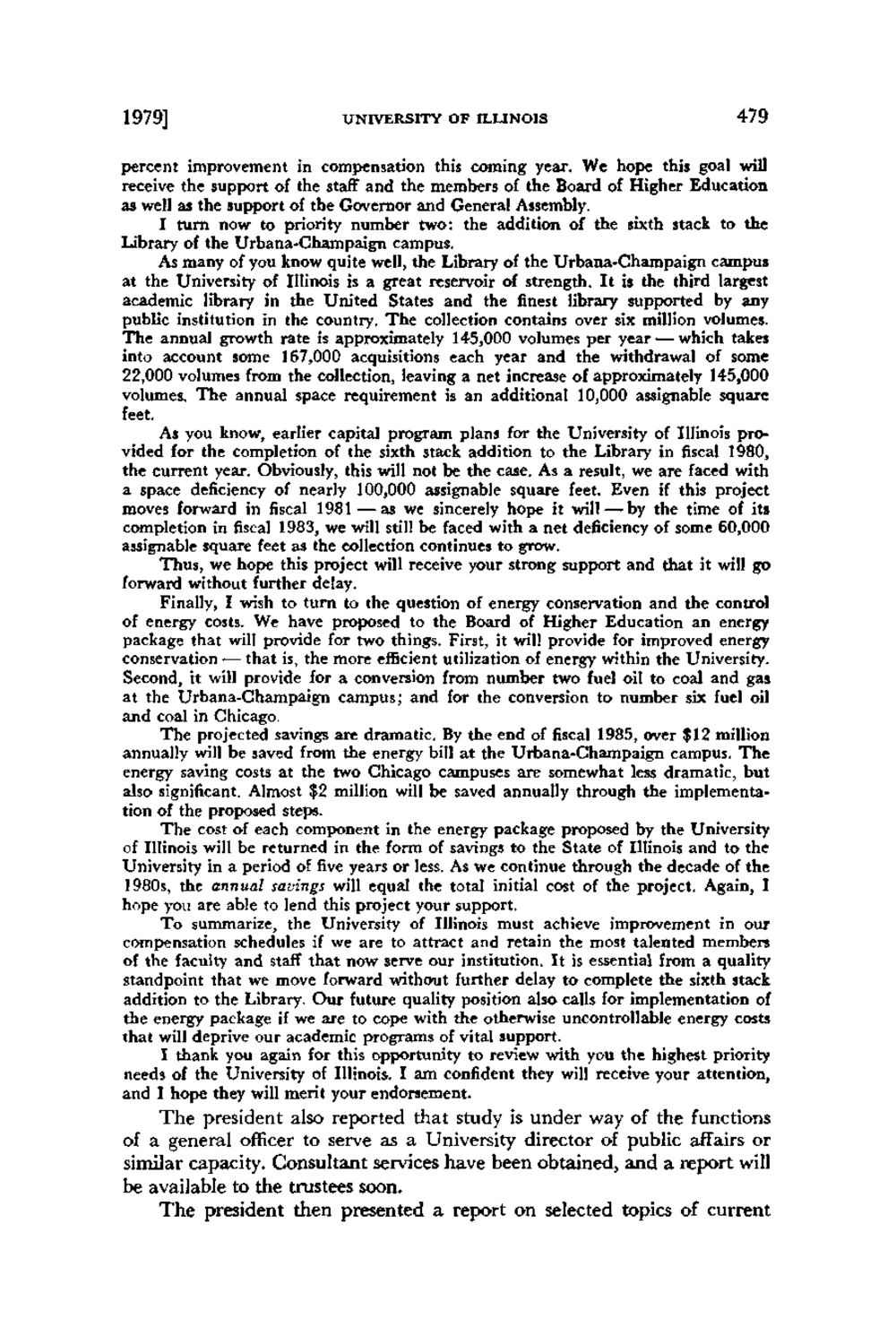| |
| |
Caption: Board of Trustees Minutes - 1980
This is a reduced-resolution page image for fast online browsing.

EXTRACTED TEXT FROM PAGE:
1979] UNIVERSITY OF ILLINOIS 479 percent improvement in compensation this coming year. We hope this goal will receive the support of the staff and the members of the Board of Higher Education as well as the support of the Governor and General Assembly. I turn now to priority number two: the addition of the sixth stack to the Library of the Urbana-Champaign campus. As many of you know quite well, the Library of the Urbana-Champaign campus at the University of Illinois is a great reservoir of strength. I t is the third largest academic library in the United States and the finest library supported by any public institution in the country. T h e collection contains over six million volumes. The annual growth rate is approximately 145,000 volumes per year — which takes into account some 167,000 acquisitions each year and the withdrawal of some 22,000 volumes from the collection, leaving a net increase of approximately 145,000 volumes. T h e annual space requirement is an additional 10,000 assignable square feet. As you know, earlier capital program plans for the University of Illinois provided for the completion of the sixth stack addition to the Library in fiscal 1980, the current year. Obviously, this will not be the case. As a result, we are faced with a space deficiency of nearly 100,000 assignable square feet. Even if this project moves forward in fiscal 1 9 8 1 — a s we sincerely hope it w i l l — b y the time of its completion in fiscal 1983, we will still be faced with a net deficiency of some 60,000 assignable square feet as the collection continues to grow. Thus, we hope this project will receive your strong support and that it will go forward without further delay. Finally, I wish to turn to the question of energy conservation and the control of energy costs. We have proposed to the Board of Higher Education an energy package that will provide for two things. First, it will provide for improved energy conservation •— that is, the more efficient utilization of energy within the University. Second, it will provide for a conversion from number two fuel oil to coal and gas at the Urbana-Champaign campus; and for the conversion to number six fuel oil and coal in Chicago. T h e projected savings are dramatic. By the end of fiscal 1985, over $12 million annually will be saved from the energy bill at the Urbana-Champaign campus. T h e energy saving costs at the two Chicago campuses are somewhat less dramatic, but also significant. Almost $2 million will be saved annually through the implementation of the proposed steps. T h e cost of each component in the energy package proposed by the University of Illinois will be returned in the form of savings to the State of Illinois and to the University in a period of five years or less. As we continue through the decade of the 1980s, the annual savings will equal the total initial cost of the project. Again, I hope you are able to lend this project your support. T o summarize, the University of Illinois must achieve improvement in our compensation schedules if we are to attract and retain the most talented members of the faculty and staff that now serve our institution. It is essential from a quality standpoint that we move forward without further delay to complete the sixth stack addition to the Library. Our future quality position also calls for implementation of the energy package if we are to cope with the otherwise uncontrollable energy costs that will deprive our academic programs of vital support. I thank you again for this opportunity to review with you the highest priority needs of the University of Illinois. I am confident they will receive your attention, and I hope they will merit your endorsement. T h e president also reported that study is under way of the functions of a general officer to serve as a University director of public affairs or similar capacity. Consultant services have been obtained, and a report will be available to the trustees soon. T h e president then presented a report on selected topics of current
| |